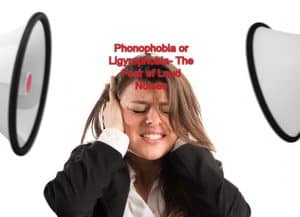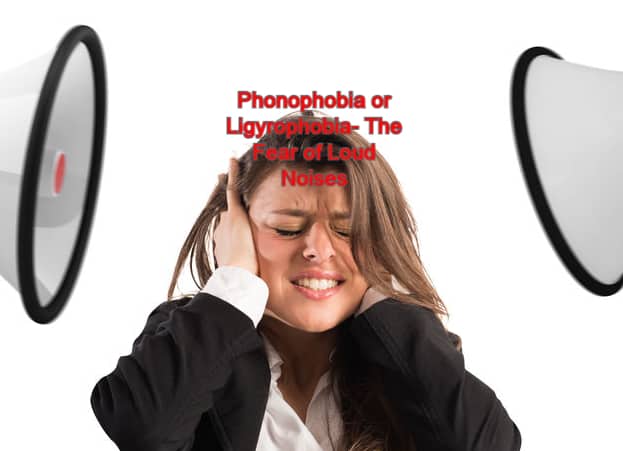Share This Article
The Fear of Loud Noises: Phonophobia or Ligyrophobia
Does your heart pound madly when you hear fireworks?
Are you easily startled by the boom of thunder or a sudden shriek?
Do you instantly panic when you hear a fire alarm or ambulance siren?
Do you get all fidgety whenever someone raises their voice? Do you want to run away from the roar of a cheering crowd? Does the sound of a wailing infant drive you out of your mind?
All of us feel a little startled when a loud noise takes us by surprise. But if you’re one of those who absolutely cannot bear this, chances are you’re suffering from phonophobia or ligyrophobia.
So, what does phonophobia or ligyrophobia mean? It’s referred to as the condition where a person is scared of loud noises. Read on to find out what causes this phobia and how you can deal with it.

What Is Phonophobia?
Before trying to understand phonophobia, it’s important to first understand what a phobia is. A phobia is a persistent, uncontrollable, and irrational fear. When exposed to certain triggers, a phobic person experiences a deep dread or even panic.
What is fonofobia or phonophobia? The term phonophobia comes from the Greek language. Phōnē means “voice” or “sound” while phobos means “fear”.
Those with phonophobia may develop fears of all loud noises or certain loud noises, such as shouting. This fear of shouting may make you feel hesitant to be in social situations. You might work to avoid crowds, such as those at concerts. Major events are a no-no.
How Common Is Phonophobia?
Is it normal to be scared of loud noises? You’d be surprised at the number of people who have a severe reaction to an ear-splitting noise. This condition can be manifested by people of any age group.
While this phobia is more common in children, adults aren’t immune to it either. Like any stimuli, loud noises are likely to get a reaction from small children. Luckily, they soon learn to cope with unexpected noises. If a child’s fear goes on for half a year or more, seek professional help.
Some people feel embarrassed to have this phobia. It can be hard to explain why you are terrified by everyday sounds, no matter how loud. Sufferers of phonophobia may hesitate to confide in their loved ones or even doctors.
What Causes the Fear of Loud Noises?
Have you ever wondered, “Why do loud noises give me anxiety?” While it is not possible to determine the exact cause of this phobia, certain factors make you more prone to developing it.
Some studies suggest that mental health issues like anxiety are associated with phobias. It may also be due to genetic factors as people who have a family history of phobias are prone to developing this condition.
External factors may also be responsible for the same. You may have experienced childhood trauma due to hearing a loud noise. As a toddler, you may have been terrified by a thunderstorm or family members shouting at each other. Children with autism are especially sensitive to stimuli, so they may also manifest this phobia.
It can be difficult to isolate the exact cause for your ligyrophobia. However, it’s enough for you to accept that this fear is real for you.
Symptoms of Phonophobia
How do you know if you have phonophobia? Those suffering from phonophobia are likely to experience a range of symptoms. If you experience any of these symptoms for a prolonged period of time, consider talking with your doctor.
Physical Symptoms
- Dizziness
- Shaky balance
- Shivering
- Breaking into sweat
- Shortness of breath
- Lightheadedness
- Nausea or vomiting
- Chills
- Increased heart rate
Mental/Emotional Symptoms
- Feeling disconnected from reality
- Having muddled thoughts
- Being unable to express anything
- Anxiety
- Irritability
- Panic attacks
- Aggression
- Frustration
- Irritation
If you’re suffering from this phobia, you may feel withdrawn from everyone and everything. You might not have the motivation to do things that would expose you to your phobia triggers. This avoidance can be so extreme that it starts to have a negative impact on your life.
If you’re constantly worried about your dread of loud noises, stress is a given. It’s no wonder phobias can lead to more serious health issues. As they say, your mental state is as important as your physical health, if not more.
Self-Help Practices for Phonophobia
Before consulting a medical professional, you can try to work on your fears by yourself. To begin with, you need to have the determination to face your fears and confront them. In this battle against your fear of shouting, the only weapon you’ll need is a strong will.
Plan Your Way
The first step is to come up with a self-help program that will help you stand up to your fears. If you have trouble coming up with a plan on your own, consult a psychologist.
Make Healthy Lifestyle Changes
You may need to make some changes in your lifestyle, starting with getting proper sleep, eating healthy meals, and getting regular exercise. It’s also a good idea to reduce your caffeine intake. That includes chocolate and coffee, unfortunately.
Control Your Reaction
Don’t forget to check out some relaxation techniques so that you can control your breathing. Activities such as yoga or meditation can also aid in attaining peace of mind, which is important. This way, being exposed to a blaring noise won’t send you into an uncontrollable panic attack.
Practice Visualization
Other than that, you can also work on visualization techniques. Here you’ll learn how to deal with your phobia yourself in a bold manner. Try to imagine how you’ll react if you hear a deafening noise. How will you feel? What will you do?
Join a Phobia Support Group
Having a phobia is no cakewalk, but you’re not alone in your journey of confronting your phobias. Participate in self-help groups or clubs that focus on this phobia. You can share practical tips and encouraging stories without fear of being judged or mocked.
Seeking Professional Help for the Fear of Loud Noises
If the above-mentioned self-help techniques don’t work, you must consult a medical practitioner. Several types of treatment can be used to cure this phobia.
Exposure Therapy
In this type of psychotherapy, you’ll be exposed to your fear repeatedly but under the guidance of your therapist. This is done in a safe, controlled environment. You can undergo this type of therapy in both individual and group sessions.
Cognitive Behavioral Therapy
This type of therapy is highly effective for curing specific phobias. It’s a combination of different methods that involve discussing the reasons for your fear. Your therapist will give advice that will help you manage your symptoms.
Medications can also help you face your fears but are used to help manage symptoms, not cure the phobia.
No two people have the same reaction to their fears, so what works for one person may not work for you.
How to Avoid It Altogether
Are you still bewildered about how to cope with noise anxiety? While you can’t avoid all of your triggers, you can still make positive choices to help you cope. Each decision is a step toward reclaiming your life from this unreasonable fear.
It can be an uphill battle, but it is possible to overcome the terror of loud sounds. Put up a strong front and be ready to win the fight against your phobia.
Conclusion
Phonophobia can be treated, provided you’re willing to devote the necessary time and effort. Whether this condition has been present since childhood or has been acquired during adulthood, you can still confront it.
Soon, your fear of loud sounds will be a thing of the past. Instead of crying in terror, you’ll merely shrug off a startling noise.




